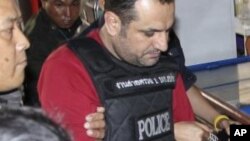Thailand is investigating a Lebanese man accused of stockpiling illegal explosives. His detention came after the United States and other nations issued a terrorism warning for Bangkok. Thai authorities objected to the warning, making it a rare public rift between the counterterrorism allies.
Thai investigators on Tuesday said they are still questioning Atris Hussein, a Lebanese man with Swedish citizenship detained last week at Bangkok’s Suvarnabhumi airport.
Authorities say they believe Hussein is linked to the Hezbollah militant group, which the United States considers a terrorist organization. Hezbollah denies he is a member.
His detention was announced shortly after the U.S. Embassy issued a warning of a credible threat of a terrorist attack in Bangkok. Thai officials initially scolded the United States and several other Western nations that echoed the warning for not consulting them first.
But on Monday, Thai police accused Hussein of possessing illegal explosives after he led them to a warehouse southwest of the capital, where they found tons of fertilizer and chemicals that can be used to make bombs.
Despite the illegal haul, Thailand’s police Chief Priewpan Damapong insisted there never was a threat of a terrorist attack.
He says officials are certain that Thailand is cleared from any attack and they believe the country was just a transit point for the explosives. With all the evidence that they have and the intelligence reports, he says there is no real threat to Thailand’s tourist spots such as Khao San road or anywhere else. However, police are still aware of the threat and will not underestimate the situation said Damapong.
Analysts say Thai authorities were not happy with the terrorism warning. because of the potential impact on tourism and trade.
Rohan Gunaratna, the head of the International Center for Political Violence and Terrorism Research in Singapore, says Hezbollah has demonstrated that it is a real threat to Thailand and the region.
“The Lebanese Hezbollah has traditionally operated in Thailand," he said. "In fact, we have a number of cases of terrorists from the Lebanese Hezbollah group planning and preparing attacks in Thailand and the region. In the mid 1990s there were several plots by Lebanese Hezbollah uncovered. For example, there was a plan to hit the Israeli and the American embassies in Singapore and also in Thailand.”
Gunaratna says Hezbollah was responsible for a failed car bomb attack on the Israeli Embassy in 1994. It was only narrowly avoided after the truck packed with explosives was in a minor traffic accident and the driver fled the scene.
At times, Thailand’s anti-terrorism cooperation with the United States has been controversial.
Thailand was alleged to be one of the first “black sites” where U.S. intelligence agents held and questioned terrorist leaders.
The U.S.-Thai anti-terrorism cooperation is essential to keeping Thailand the region safe said Gunaratna.
“The Americans have had sustained and continuous presence in Bangkok, funded and supported so many training programs and other forms of assistant to build counter-terrorism capacity in Southeast Asia," said Gunaratna. "And, Thailand is in many ways a key node [complication] for that cooperation that has kept this region safe from terrorism.”
Despite the arrest of Hussein and confiscated explosives, the U.S. Embassy said the terrorism warning issued Friday still stands.
Thai media reports indicate Hussein had at least one accomplice, who is still at large.




